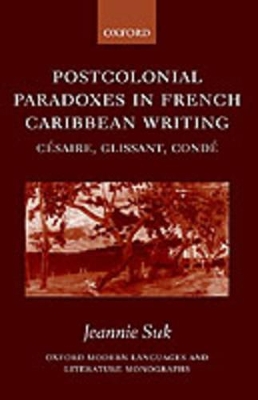Oxford Modern Languages and Literature Monographs
1 total work
This book is the first major study of French Caribbean literature in light of the concept of postcoloniality. Postcolonial theory debates have developed in the anglophone domain, and have not as yet referred prominently to francophone literature. Jeannie Suk investigates how the literature of Martinique and Guadeloupe provides a kaleidescopic view of the paradoxes at the heart of postcoloniality. Through subtle and provocative readings of Aime Cesaire,
Edouard Glissant, Maryse Conde, Baudelaire, Freud, and others, she illuminates how the development of French Caribbean literature and debates about negritude, antillanite, and creolite contribute to theories of in-betweenness and incompleteness central to postcolonial modes. In each chapter, lively and detailed
analyses of literary and critical texts reveal connections between key thematic, conceptual, rhetorical, and psychic issues that form the interface of Caribbean and postcolonial concerns. The first part paves theoretical ground, focusing on readings of two seminal texts, Cesaire's Cahier d'un retour au pays natal and Glissant's Discours antillais; the second part concentrates on Maryse Conde's exemplary work. Lucidly articulating the overlap and interplay of the distance of oceanic
crossing, the discontinuities of allegorical signification, and the gap at the heart of trauma, Suk probes the paradoxical dynamic of impossible yet inevitable returns in space, time, and the psyche. She shows how literal and metaphorical "crossings" both produce and impede history and representation. The result
is a new framework for understanding the intersection of postcolonial, psychoanalytic, deconstructive, and French Caribbean problems in a language attentive to improbable recurrences across theories and registers. Postcolonial Paradoxes is a major contribution to criticism and theory, of interest to scholars and students of postcolonialism, Caribbean and African diaspora literature, French literature, and psychoanalysis.
Edouard Glissant, Maryse Conde, Baudelaire, Freud, and others, she illuminates how the development of French Caribbean literature and debates about negritude, antillanite, and creolite contribute to theories of in-betweenness and incompleteness central to postcolonial modes. In each chapter, lively and detailed
analyses of literary and critical texts reveal connections between key thematic, conceptual, rhetorical, and psychic issues that form the interface of Caribbean and postcolonial concerns. The first part paves theoretical ground, focusing on readings of two seminal texts, Cesaire's Cahier d'un retour au pays natal and Glissant's Discours antillais; the second part concentrates on Maryse Conde's exemplary work. Lucidly articulating the overlap and interplay of the distance of oceanic
crossing, the discontinuities of allegorical signification, and the gap at the heart of trauma, Suk probes the paradoxical dynamic of impossible yet inevitable returns in space, time, and the psyche. She shows how literal and metaphorical "crossings" both produce and impede history and representation. The result
is a new framework for understanding the intersection of postcolonial, psychoanalytic, deconstructive, and French Caribbean problems in a language attentive to improbable recurrences across theories and registers. Postcolonial Paradoxes is a major contribution to criticism and theory, of interest to scholars and students of postcolonialism, Caribbean and African diaspora literature, French literature, and psychoanalysis.
